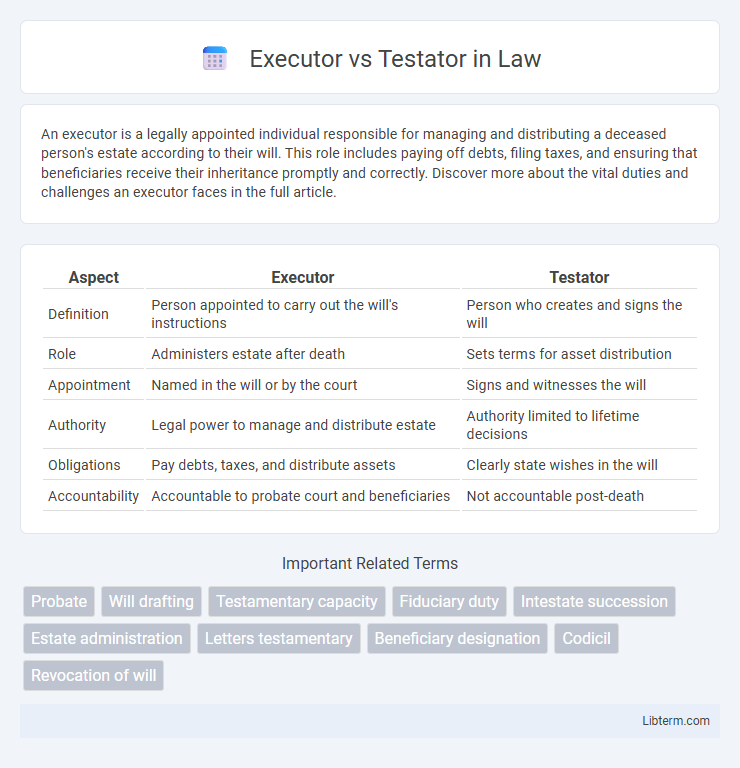An executor is a legally appointed individual responsible for managing and distributing a deceased person's estate according to their will. This role includes paying off debts, filing taxes, and ensuring that beneficiaries receive their inheritance promptly and correctly. Discover more about the vital duties and challenges an executor faces in the full article.
Table of Comparison
| Aspect | Executor | Testator |
|---|---|---|
| Definition | Person appointed to carry out the will's instructions | Person who creates and signs the will |
| Role | Administers estate after death | Sets terms for asset distribution |
| Appointment | Named in the will or by the court | Signs and witnesses the will |
| Authority | Legal power to manage and distribute estate | Authority limited to lifetime decisions |
| Obligations | Pay debts, taxes, and distribute assets | Clearly state wishes in the will |
| Accountability | Accountable to probate court and beneficiaries | Not accountable post-death |
Understanding the Roles: Executor vs Testator
The testator is the individual who creates and signs a will, outlining how their assets and estate should be distributed after death. The executor is the person appointed by the testator, or by the court if no executor is named, to administer the estate according to the instructions in the will. Their responsibilities include collecting assets, paying debts, and distributing property to beneficiaries as specified by the testator's wishes.
Key Responsibilities of an Executor
The executor is responsible for managing and distributing the deceased's estate according to the will, paying outstanding debts and taxes, and ensuring all legal requirements are met during probate. They must inventory assets, secure property, and notify beneficiaries and institutions of the death. Unlike the testator, who creates and authorizes the will, the executor carries out its instructions and safeguards the estate throughout the settlement process.
Defining the Testator in Estate Planning
The testator is the individual who creates a will to specify how their assets and estate will be distributed after death, forming the foundation of estate planning. This person holds the legal capacity to make decisions about the distribution of property, guardianship of dependents, and appointment of executors. Understanding the testator's intentions ensures that the executor carries out the estate plan according to the testator's precise wishes.
Legal Requirements for Executors
Executors must meet specific legal requirements, including being of legal age, mentally competent, and often required to post a bond to ensure fiduciary responsibility. Many jurisdictions disqualify individuals with criminal records or conflicts of interest from serving as executors. Unlike testators, who create the will, executors are legally mandated to administer the estate following probate laws and court supervision.
Rights and Duties of a Testator
A testator holds the right to create, amend, or revoke a valid will, ensuring their estate is distributed according to their wishes after death. Their duties include clearly outlining asset distribution, appointing an executor to manage the estate, and complying with legal formalities during will creation. Unlike the executor who administers the estate post-mortem, the testator's responsibilities end once the will is duly executed and witnessed.
Choosing the Right Executor
Choosing the right executor is crucial for ensuring a smooth estate administration and honoring the testator's final wishes. Executors must possess trustworthiness, organizational skills, and the ability to handle legal and financial responsibilities effectively. Selecting a competent executor reduces the risk of probate delays and potential disputes among beneficiaries.
Common Challenges Faced by Executors
Executors frequently encounter challenges such as managing complex estate inventories, resolving disputes among beneficiaries, and ensuring compliance with probate laws and tax requirements. They must also address creditor claims, secure and protect estate assets, and handle deadlines for filing necessary documents with courts. Effective communication skills and meticulous record-keeping are crucial in navigating these responsibilities to avoid legal complications and delays.
How Testators Influence the Probate Process
Testators shape the probate process by determining the distribution of assets through their valid wills, which serve as the legal foundation for estate administration. Their clear instructions reduce ambiguities, helping executors execute the will efficiently and minimize probate disputes. Well-drafted wills by testators streamline court approvals, facilitate timely asset transfers, and protect beneficiaries' interests during probate.
Executor vs Testator: Frequently Asked Questions
An executor is the individual appointed to administer and distribute the estate according to the will, whereas the testator is the person who creates and signs the will. Frequently asked questions about executor vs testator often concern their distinct roles, legal responsibilities, and how an executor is chosen or challenged. Understanding these differences is crucial for clear estate planning and probate processes.
Tips for Smooth Estate Administration
Choosing a trustworthy and organized executor ensures efficient estate administration and minimizes legal complications for the testator's beneficiaries. Providing the executor with a comprehensive list of assets, liabilities, and important documents, such as the will, insurance policies, and financial statements, facilitates a smoother probate process. Clear communication between the testator, executor, and heirs about intentions and expectations reduces delays and potential disputes during estate settlement.
Executor Infographic

 libterm.com
libterm.com